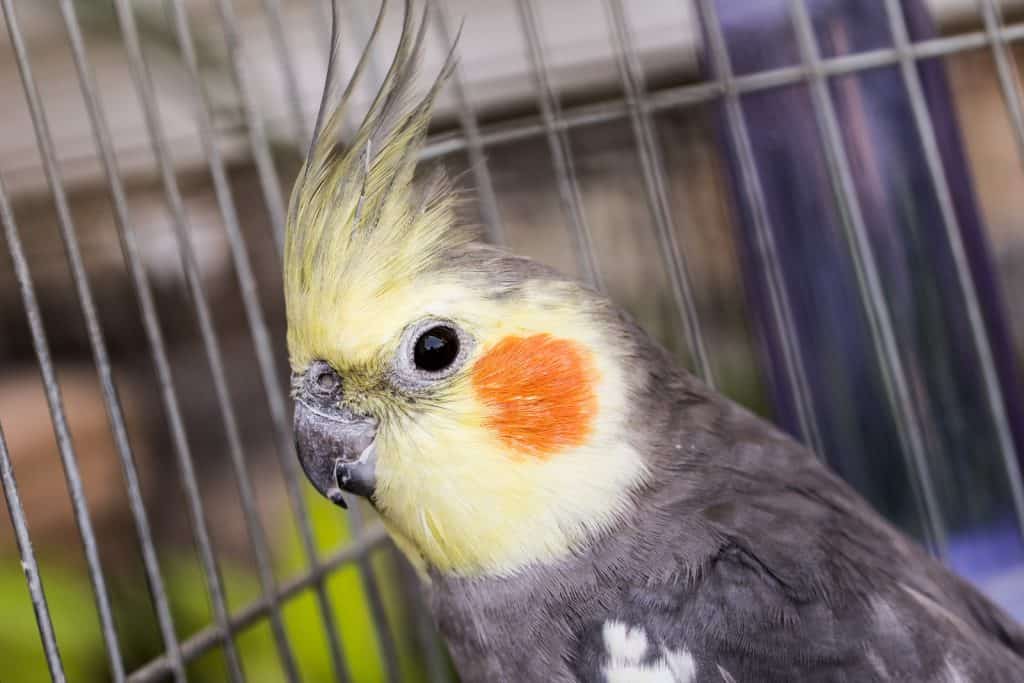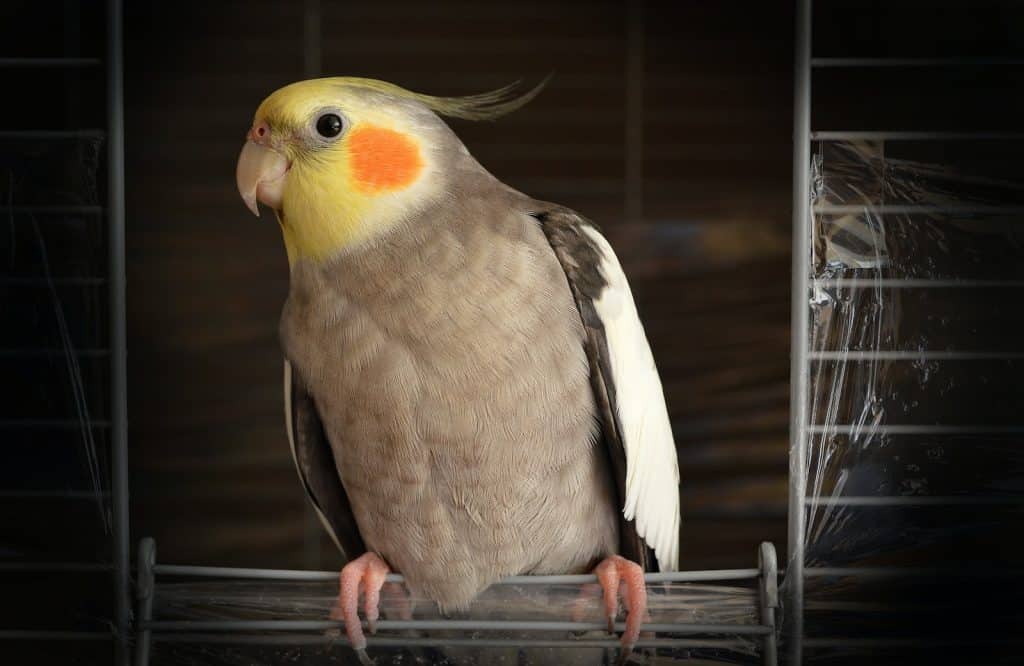A cockatiel is a great, friendly pet bird to have, but it might take some time for your new feathered friend to adjust to their new home. They are smart birds, however moving can be very stressful for them so give them (and yourself) some time before things become too familiar. So, how to make your new cockatiel feel at home?
How to Make Your New Cockatiel Feel at Home?
To make them feel at ease, allow them plenty of time to adjust to their new surroundings. Once they’ve gotten used to it, spend some time with them by talking to them, giving delicious snacks, and releasing your feathered pet for play. There are a variety of options for how you may care for your Cockatiel.
How Do I Get My New Cockatiel Used To Me?
Learning how to make your new cockatiel feel at home takes some time. The majority of the time, the quality of your bond with your new cockatiel is determined by how you interact with them during the first few days after getting them. The first rule is to provide your cockatiel space to relax on their own in the cage, which will help them get used to you. Do not pester your cockatiel.
Then, you can begin spending time with them gradually by sitting next to them. After that, you may begin engaging with them. If they get used to seeing you around them, give them something delicious to eat.
At this time, you can connect with your bird by letting it start eating out of your hand and going out of the cage for playtime. Once they are familiar with you, they will learn to like you. Make sure to spend undivided attention on them. Play with them often, offer treats, teach them tricks, etc.

How to Make Your New Cockatiel Feel at Home And Get Used To A New Home?
Cockatiels can have a tough time transitioning to new surroundings. These birds are prone to stress when they relocate someplace else or change homes.
How you interact with them as their owner matters greatly for how well theyadjust.
There are ways that can ease your bird into its new home sweet home. Take a look at the tips below:
1. Keep Its New Environment Peaceful
If you want your cockatiels to be happy and healthy, try to put your pet in cockatiel’s cage in a room where there are bird toys and aren’t many loud noises. They will likely need a few days to get used to the new surroundings, but it’ll be worth it for them in the long run. If you don’t have an area like this available, make sure that they’re at least not located near other noise sources such as family members or pets.
2. Let Your Bird Have The Chance To Settle In
As the proprietor, you are overjoyed to welcome a new pet into your home. You’ve been observed to exhibit such enthusiasm that you can’t help but talk or play with them. Allow them time to get used to their new cage and acclimate themselves to the fresh air before disturbing them. Rather of startling them right away, give them a chance on their own terms.
How to Make Your New Cockatiel Feel at Home and How Long Is The Adjustment Period?
It usually takes a few days to two weeks for a new cockatiel pet to get used to its new surroundings at home. Do not immediately put them in the cage as soon as you get them home. Instead, spend at least 20 minutes with them.
Why Is My New Cockatiel So Quiet?
If your new cockatiel is quiet when you bring it home, don’t worry–this reaction is new cockatiel behavior. It may also be due to the bird’s personality. Your new feathered pet is still learning about and observing its environment. Give it some time to adjust to its new surroundings before drawing any conclusions about its behavior. As days pass, keep an eye out for possible changes in behavior, such as shivering or not washing itself regularly.
How to Make Your New Cockatiel Feel at Home When It Looks So Nervous?
When your cockatiel nervous it is experiencing anxiety or stress, it may act differently than usual. This is because, similar to humans, new bird or cockatiels get stressed when they’re discomforted by change. This could include changes in their environment, routine, or surroundings. If you notice your bird behaving oddly, check to see if anything has recently changed in its life.
Beak Grinding
Your bird might be tired if it keeps yawning because this is a common behavior before they take a nap. Even if your bird is currently sleeping, it may still yawn occasionally. In addition to being sleepy, frequent yawning can help reduce the build-up of living tissue and overgrowth on its lower or upper mandible.
Wags Its Tail
This is a great indication that your new cockatiel is satisfied and content. It may suggest that they are at ease and enjoying their lives to the full. Wagging its tail also indicates greeting its human owner or buddy. However, if this is accompanied by screaming, it might be an indication of sickness.
Lifts One Foot Up Into The Air
When a new cockatiel is being threatened, it’s common to witness this type of hissing. Birds have an aggressive aspect. As a consequence, they will defend themselves by biting.
Hangs Like A Bat
This is just your new cockatiel’s way of being. This implies that they are having a great time and are being playful. This can be done by aggressively flapping its wings. It might either be a straightforward indication of potential dangers or a method to keep fit in the cage.
How to Make Your New Cockatiel Feel at Home – Bottom Line
Although cockatiels are lovely, smart, and social creatures that make great pets, they may become stressed in new environments. When moving to a new home, they may show symptoms of anxiety such as tenseness, loss of appetite, or silence for several days.
However, there are easy ways to make your feathered pet feel at home and comfortable with you. Part of their adjustment includes some behaviors that are considered normal until they trust you or feel safe in their surroundings. As you journey with your new pet, various behaviors might arise which cause wonder at first. But thesebehaviors can be learned overtime through continuous observation.
Learn whether a cockatiel can eat too much millet and understand the dietary balance needed for your bird. Ever wondered why your cockatiel flies onto your head? Find out the reasons behind this behavior and how to manage it. Discover the benefits of preparing chop for your cockatiel and ensure your feathered friend gets a nutritious, varied diet. If you’re curious about treats, explore whether sunflower seeds are safe for your cockatiel.
- How Can Your Other Pets Be Harmful To Your Cockatiel
- How Cockatiels Show Affection
- How Do Children Make Cockatiels As Pets
- How Do Cockatiels See
- How Do Cockatiels Sleep
- How Do Fumes Affect Your Cockatiel
- How Do You Care For Your Cockatiel Everyday
- How Do You Choose A Cage For Your Cockatiel
- How Do You Medicate Cockatiels
- How Do You Provide Your Cockatiel With Water
- How Do You Select Your Cockatiel
- How Do You Tame A Cockatiel
- How Does A Cockatiel Got Her Name
- How Far Can A Cockatiel Fly
- How Far Can A Cockatiel See
- How Fast Can Cockatiels Fly
- How Good Is A Cockatiels Memory
- How Long Can A Cockatiel Go Without Food
- How Long Can Cockatiels Go Without Water
- How Long Do Cockatiels Actually Live For In Captivity
- How Long Do Cockatiels Live In Captivity
- How Long Does It Take For Clipped Wings To Grow Back
- How Long Does It Take For Cockatiel Tail Feathers To Grow Back
- How Long Should A Cockatiel Be Out Of Its Cage
- How Often Do Cockatiels Lay Eggs
- How Often Do Cockatiels Poop
- How Often Should A Cockatiel Go To The Vet
- How Should I Set Up My Cockatiels Cage
- How To Bathe Your Cockatiel
- How To Bird Proof A Room
- How To Bond Two Cockatiels
- How To Bond With A Scared Cockatiel
- How To Build Trust With A New Cockatiel
- How To Calm A Stressed Cockatiel
- How To Care For Your Cockatiels Health
- How To Care For Your Cockatiels Nails
- How To Catch A Cockatiel
- How To Clean Cockatiel Nose
- How To Clip A Cockatiels Nails
- How To Discipline A Cockatiel
- How To Find A Cockatiel That Flew Away
- How To Get A Cockatiel Back Into Its Cage
- How To Get A Cockatiel To Go On Your Hand
- How To Get A Cockatiel To Like You
- How To Get A Cockatiel To Sit On Your Finger
- How To Give Your Cockatiel Exercise
- How To Grow Millet For Cockatiels
- How To Hold A Cockatiel
- How To Introduce A New Cockatiel To Another
- How To Keep A Cockatiel Quiet
- How To Keep A Cockatiel Warm 10 Tips And Tricks
- How To Maintain A Clean Cockatiel Cage
- How To Make Your New Cockatiel Feel At Home
- How To Manage Multiple Cockatiels In One Household
- How To Monitor Your Cockatiels Health
- How To Prepare Your Cockatiel For Travel
- How To Prevent Your Cockatiel From Becoming Stressed
- How To Recognize And Treat Cockatiel Anxiety
- How To Take Care Of An Older Cockatiel
- How To Tame A Cockatiel That Bites
- How To Tame Your Cockatiel
- How To Teach A Cockatiel To Talk
- How To Tell If A Cockatiel Is In Pain
- How To Tell The Age Of A Cockatiel
- How To Toilet Train Your Cockatiel
- How To Train A Cockatiel To Fly To You 8 Steps
- How To Train A Cockatiel To Poop In One Place
- How To Train Naughty Cockatiels
- How To Transition Your Cockatiel To A New Cage
- How To Transport A Cockatiel To The Vet
- How To Trim A Cockatiels Beak
- How To Trim Your Cockatiels Wings



